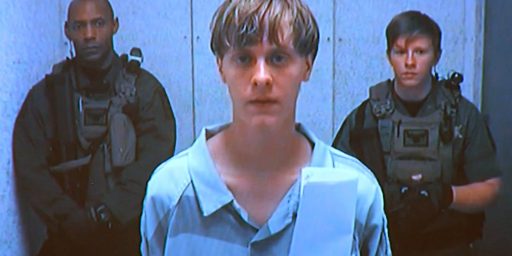Dylann Roof Ruled Competent To Stand Trial
Now, the road to trial will move forward.
The Federal Judge presiding over the murder trial of Dylann Roof, who killed nine people in a historic church in Charleston last year, has ruled that he is competent to stand trial, thus seemingly removing the only barrier holding back a trial set to begin soon:
Dylann S. Roof, the self-avowed white supremacist who is accused of killing nine black parishioners at a Charleston, S.C., church in June 2015, is competent to stand trial, a federal judge ruled Friday.
Judge Richard M. Gergel of Federal District Court in Charleston did not explain his decision beyond writing that he had considered “the record before the court, the relevant legal standards and the arguments of counsel.” The judge did not release a transcript of a two-day closed hearing this week about Mr. Roof’s condition, and he issued his factual findings under seal.
The ruling means that individual questioning of prospective jurors — a process that was scheduled to start on Nov. 7 but was delayed when Mr. Roof’s defense lawyers raised questions about his mental status — will begin Monday.
The Justice Department is seeking the death penalty against Mr. Roof, 22, in the massacre on the night of June 17, 2015, at the historic Emanuel African Methodist Episcopal Church. Mr. Roof, through his defense lawyers, has offered to plead guilty in exchange for a life sentence, but prosecutors have refused to accept that deal, which would avert a trial on the 33-count federal indictment.
A lawyer for Mr. Roof, David I. Bruck, did not respond to a request for comment on Friday. He has refused to discuss his concerns about Mr. Roof’s competency outside the closed proceedings, which Judge Gergel said were necessary to protect the defendant’s right to a fair trial by an impartial jury.
Judge Gergel said Friday that in addition to reviewing affidavits from three people, he heard testimony from five witnesses, including Dr. James C. Ballenger, a psychiatrist who examined Mr. Roof. The judge did not disclose any of the information he received, and much of the legal wrangling surrounding the matter of Mr. Roof’s competency happened in sealed court filings.
To declare Mr. Roof incompetent and delay his trial, Judge Gergel would have had to conclude that he was “presently suffering from a mental disease or defect rending him mentally incompetent to the extent that he is unable to understand the nature and consequences of the proceedings against him or to assist properly in his defense.” The judge used a “preponderance of the evidence” standard to reach his decision.
As I explained when I wrote about this several weeks ago when the issue of Roof’s competence was first raised by the presiding Judge, the issue of whether or not Roof is competent to stand trial is primarily an effort to determine his present mental state rather than anything related to his mental state at the time of the shootings. Essentially, to find a Defendant is incompetent to stand trial, a court would essentially have to find that they are so mentally delusional that they are unaware of their present situation, don’t have a grip on reality, and are essentially out of touch with reality. Given the high standard, it’s not a finding that Court’s frequently reach except in cases where a Defendant is severely mentally ill. Had Roof been found incompetent, he would have been sent for treatment in a medical facility run by the Federal Bureau of Prisons where he would have been treated by psychiatrists and similar physicians and in the mean time his Federal and state trials would have been put on hold. If and when it was determined that Roof was competent, he would have been sent back to South Carolina and the trials would have moved forward. Now that the Judge has determined he’s competent, though, both his Federal and state trials can move forward, although it appears that the Federal trial will be taking place first.
With regard to that trial, Federal Prosecutors have already announced that they will seek the death penalty, but even many of the families of the dead aren’t sure that’s the appropriate sentence in this case:
The Rev. Sharon Risher often thinks these days about what she calls her “humanness”: the passing impulse to crave the execution of the white supremacist accused of killing her mother and eight other black churchgoers last year.
“My humanness is being broken, my humanness of wanting this man to be broken beyond punishment,” Ms. Risher said. “You can’t do that if you really say that you believe in the Bible and you believe in Jesus Christ. You can’t just waver.”
But after delays, the Federal District Court here will begin on Monday the long process of individually questioning prospective jurors for the capital trial of Dylann S. Roof, who is charged with 33 federal counts, including hate crimes, in the June 17, 2015, killings at the Emanuel African Methodist Episcopal Church.
Mr. Roof, whom a judge on Friday declared competent to stand trial, has offered, in exchange for a sentence of life in prison, to plead guilty. The government has refused to make such a plea agreement.
The 17-month path to Mr. Roof’s first death penalty trial — the state of South Carolina is also seeking his execution — has been marked by public demonstrations of forgiveness and reconciliation. But the federal government’s decision to pursue Mr. Roof’s execution is widely questioned, and it is in defiance of the wishes and recommendations of survivors of the attack, many family members of the dead and some Justice Department officials. Even South Carolina’s acrimonious debate about the display of the Confederate battle flag outside the State House was less divisive in this state, polling shows.
In May, Attorney General Loretta E. Lynch announced her decision to seek the death penalty against Mr. Roof, and critics of that choice make different, if sometimes overlapping, arguments.
Some are opposed to capital punishment in every instance because they doubt its efficacy or morality. Others argue that because a death sentence for Mr. Roof would prompt years of appeals, the decision can only protract the emotional agony of a massacre that rattled the nation. And still others contend that executing a young man like Mr. Roof, who is 22, could allow him to escape decades of punishment.
“I want that guy every morning when he wakes up, and every time he has an opportunity for quiet and solitude, to think of what Tywanza said to him: ‘We mean you no harm. You don’t have to do this,'” said Andrew J. Savage III, a Charleston lawyer, referring to Tywanza Sanders, a 26-year-old man who died in the attack. Mr. Savage represents three survivors, including Mr. Sanders’s mother, and many family members of the victims who became known here as the Emanuel Nine.
But Ms. Lynch chose to seek the death penalty after a contentious review process that included South Carolina’s top federal prosecutor siding with Mr. Roof’s defense lawyers in their offer of a guilty plea in exchange for a life sentence. Ms. Lynch said that “the nature of the alleged crime and the resulting harm compelled this decision.”
In a court filing the same day the attorney general made her decision public, the Justice Department cited nine aggravating factors, including that Mr. Roof had “expressed hatred and contempt towards African-Americans, as well as other groups, and his animosity toward African-Americans played a role in the murder charges in the indictment.”
Prosecutors also said that Mr. Roof had “demonstrated a lack of remorse” and that he had caused “injury, harm and loss to the individuals that he killed as well as to the family, friends and co-workers of those individuals.”
As noted, South Carolina is seeking the death penalty in the state trial as well, but the issue of how Roof should be punished has that deeply red and conservative state remarkably divided on whether or not death is an appropriate punishment:
The question of whether Mr. Roof should face execution surfaced soon after the killings, which happened during a Wednesday night Bible study at the whitewashed, historic church on Calhoun Street. Within 48 hours of the shootings, and less than a day after Mr. Roof was arrested, Gov. Nikki R. Haley of South Carolina said on television that she “absolutely will want him to have the death penalty.”
A University of South Carolina survey, conducted last spring, found that 55 percent of South Carolina residents supported a death sentence for Mr. Roof. But divisions among black and white residents were stark: The poll showed that only 31 percent of black residents wanted Mr. Roof to face execution, while some 64 percent of whites backed the use of capital punishment in the case.
Given the motive involved, one might have suspected that African-Americans would be far more in favor of showing Roof no mercy and that, given the political makeup of South Carolina in general, that there would have been more support for the death penalty for a crime that shook the state in such a personal way. To some extent, this may be a reflection of declining support for capital punishment nationwide. Recent polling, for example, has shown that, while a majority of Americans still support the death penalty that support declines when they are given the option of life in prison without parole. Additionally, the public reaction in South Carolina may be due in some part at least to the reaction of the families of Roof’s victims, who have been remarkably compassionate in their reaction to Roof from the time that he was arrested. Whatever the case, though, it is quite surprising and will make the dynamics of Roofs trial interesting. In both the Federal and state cases, there is no question about his guilt. This means that the trials will both ultimately focus on sentencing, which will be in the hands of the jury in both cases. The defenses strategy in both cases will no doubt focus on trying to spare his life and get a life in prison without parole sentence. It will be interesting to see if they succeed.





I believe in the death penalty.
But if the guy is offering a guilty plea, take it.
I oppose the death penalty, because I don’t think the government should be killing its citizens. It’s a power that the government does not need, and which is imposed in a biased manner.
But, there are many greater injustices in the world that this dumb kid’s death, if it comes to that. Murderers and racists are pretty low on my my list of priorities, and murderous racists are lower still.
I have no problem with the death penalty per se. Although I can’t help but wondering if this wasn’t a death penalty case would we be going to all these iterations.
It does strike me that the defenses main effort will end up being to show that his mental state then was different than his mental state now.
I don’t believe in capital punishment, as I am a volunteer worker in prison ministry. One of the guys I’ve met in prison in the last year lost a sister at Emanuel AME, but he doesn’t want Dylan Roof dead. If he can hold to that position, so can I.
That the death penalty still exists, suggests that fundamentally we have not evolved or learned much from the days of Anne Boleyn.
Apparently Roof filed a petition last night to represent himself. The judge granted it, noting that Roof’s decision was unwise.
When the trial is over, can Roof seek to have a guilty verdict overturned on the grounds that his defense was incompetent?
@CSK: Was going to add to the thread that Mr Roof will be representing himself. Leads to the question: Is there not a different standard for ‘competent to stand trial’ from ‘competent to represent someone (even oneself) at trial’? Such a distinction would make sense. So probably there isn’t.
I do not know what it is that makes these monsters, and I will not defend his actions. I am still saddened that a young man has such a rage inside him. I pray for all involved.
@CSK:
As I note today in a post on the self-representation issue, the short answer to that question is no, he cannot allege ‘ineffective assistance of counsel” as an issue on appeal as long as the find is that his waiver of his Sixth Amendment rights was in knowing after having been advised of the dangers of representing himself in a criminal trial.
@CSK:
As I note today in a post on the self-representation issue, the short answer to that question is no, he cannot allege ‘ineffective assistance of counsel” as an issue on appeal as long as the find is that his waiver of his Sixth Amendment rights was in knowing after having been advised of the dangers of representing himself in a criminal trial.
@Doug Mataconis: @Doug Mataconis:
Thanks, Doug.